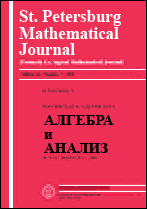|
This article is cited in 3 scientific papers (total in 3 papers)
Research Papers
Induced bounded remainder sets
V. G. Zhuravlev
Vladimir State University, Vladimir, Russia
Abstract:
The induced two-dimensional Rauzy tilings are generalized to tiling of the tori TD=RD/ZD of arbitrary dimension D. For that, a technique of embedding Tem↪TD of toric developments T into the torus TDL=RD/L for some lattice L is used. A feature of the developments T is that for a given shift S:TD⟶TD of the torus, its restriction S|T to the subset T⊂TD, i.e., the first recurrence map, or the Poincaré map, is equivalent to an exchange transformation of the tiles Tk that form a tiling of the development T=T0⊔T1⊔⋯⊔TD. In the case under consideration, the induced map S|T is a translation of the torus TDL.
It is proved that every Tk is a bounded remainder set: the deviations δTk(i,x0) in the formula rTk(i,x0)=aTki+δTk(i,x0) are bounded, where rT(i,x0) is the number of occurrences of the points S0(x0),S1(x0),…,Si−1(x0) from the S-orbit in the set Tk, x0 is an arbitrary starting point on the torus TD, and the coefficient aTk equals the volume of Tk. Explicit estimates are obtained for these deviations δTk(i,x0). Earlier, the relationship between the maps S|T and bounded remainder sets was noticed by Rauzy and Ferenczi.
Keywords:
Poincaré map, bounded remainder sets.
Received: 01.11.2014
Citation:
V. G. Zhuravlev, “Induced bounded remainder sets”, Algebra i Analiz, 28:5 (2016), 171–194; St. Petersburg Math. J., 28:5 (2017), 671–688
Linking options:
https://www.mathnet.ru/eng/aa1508 https://www.mathnet.ru/eng/aa/v28/i5/p171
|


| Statistics & downloads: |
| Abstract page: | 271 | | Full-text PDF : | 81 | | References: | 55 | | First page: | 10 |
|





 Contact us:
Contact us: Terms of Use
Terms of Use
 Registration to the website
Registration to the website Logotypes
Logotypes









 Citation in format
Citation in format 
